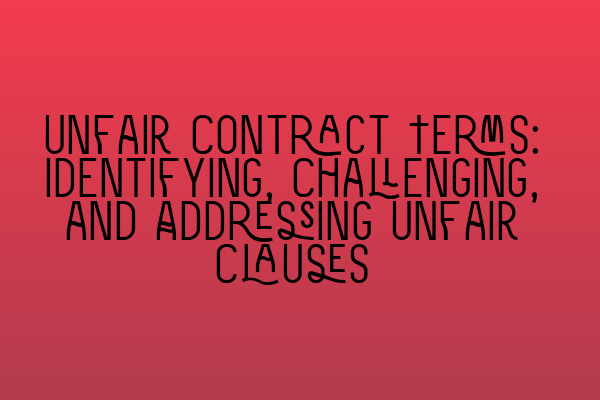Unfair Contract Terms: Identifying, Challenging, and Addressing Unfair Clauses
Welcome to the SQE Contract Law Blog! Today, we will be discussing a crucial aspect of contract law that often goes unnoticed – unfair contract terms. It is important for solicitors and individuals alike to be aware of these terms, as they can have serious implications for the rights and obligations of parties involved in a contract.
Unfair contract terms refer to provisions or clauses in a contract that may be biased, unreasonable, or disadvantageous to one party. These terms often go against the principles of fairness, and their inclusion may result in unequal bargaining power, exploitation, and potential harm to the weaker party. As solicitors, it is our duty to help clients identify, challenge, and address these unfair clauses to ensure a fair and equitable outcome for all parties involved.
Identifying Unfair Contract Terms
The first step in dealing with unfair contract terms is to identify them. As a solicitor, you must thoroughly review the contract and analyze each clause to determine if any terms are potentially unfair. Some common indicators of unfairness include:
- Imbalance of bargaining power
- Hidden or misleading terms
- Exclusion or limitation of liability
- Unreasonable cancellation or termination fees
- Unilateral modification powers
By carefully examining these aspects, you can spot potential unfairness in the contract and take appropriate actions to address them.
Challenging Unfair Contract Terms
Once you have identified unfair contract terms, the next step is to challenge them. This can be achieved through various means, such as negotiation, alternative dispute resolution methods, or in extreme cases, legal action. As solicitors, it is essential to guide clients through these challenging processes, ensuring that their rights are protected and fair outcomes are achieved.
During the negotiation stage, you can advocate on behalf of your clients and seek to amend or remove unfair terms from the contract. This may involve providing legal arguments and evidence to support your case. In some situations, alternative dispute resolution methods, such as mediation or arbitration, can be helpful in reaching a fair settlement without resorting to litigation.
If negotiation or alternative dispute resolution fails, legal action may be necessary to challenge unfair contract terms. In such cases, you will have to gather evidence, build a strong legal case, and represent your clients in court. It is important to note that legal action should be seen as a last resort, as it can be costly, time-consuming, and unpredictable.
Addressing Unfair Contract Terms
Even if you succeed in challenging unfair contract terms, it is important to address them in a proactive manner. This involves ensuring that the contract is rewritten or amended to remove or rectify the unfair clauses.
As a solicitor, it is your responsibility to draft clear, comprehensive, and fair contracts that protect the interests of all parties. By addressing unfair contract terms, you can safeguard your clients from potential harm, create a level playing field, and promote a sense of fairness in contractual relationships.
In conclusion, identifying, challenging, and addressing unfair contract terms is an integral part of contract law practice. By staying vigilant, advocating for clients’ rights, and promoting fairness, you can make a significant impact on the outcome of contracts. Remember, fairness and equity should always be the guiding principles in contract law.
If you found this article helpful, you may also enjoy reading our related articles:
- Unveiling Real-Life Case Studies: Insights into Legal Practice and Decision-Making
- Exploring Solicitor Salaries in the UK: Average Earnings and Factors Affecting Income
- Mastering Client Relationship Management: Skills for Solicitors to Enhance Trust and Loyalty
- Pursuing a Law School Education in the UK: Choosing the Right Path for Your Future
- Securing Training Contracts: A Roadmap to Becoming a Solicitor
